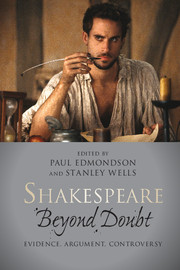Part II - Shakespeare as author
Published online by Cambridge University Press: 05 April 2013
Summary
This second section reaffirms that William Shakespeare of Stratford-upon-Avon is the author, and in some cases co-author of the works attributed to him. We begin with Andrew Hadfield's reminder (Chapter 6) that the kinds of biographical evidence we might long for are often missing. It is perfectly normal to encounter gaps in the surviving records of people's lives during Shakespeare's period, and in fact we know more about him than about many of his contemporary writers. Absence of evidence is never the same as evidence of absence, but it affects the way we need to approach historiography and to understand authorial identities. This is followed by Stanley Wells setting forth an overview of allusions to Shakespeare up until 1642, a reminder of the diversity and complexity of evidence for Shakespeare's authorship which is denied by anti-Shakespearians seeking an alternative nominee (Chapter 7). John Jowett (Chapter 8) and MacDonald Jackson (Chapter 9) then demonstrate how Shakespeare studies have come increasingly to understand Shakespeare as a collaborative playwright, which surely puts paid to all anti-Shakespearian endeavour that offers only single authors as alternatives to Shakespeare. This severe gap between what is now an established orthodoxy for most Shakespeare scholars (that Shakespeare worked in collaboration with other writers) and the on-going, late nineteenth-century-style biographical theorizing of anti-Shakespearians, is perhaps the best illustration of how the professional Shakespeare scholar and the amateur enquirer work with totally different methodologies and expectations. Looking only at the printed textual evidence of the plays, James Mardock and Eric Rasmussen (Chapter 10) then ask: what do we learn from the texts of these works about the controlling mind behind them? They demonstrate clearly that the plays’ author is a professionally acute and deeply engaged man of the theatre, rather than a non-professional aristocrat writing during his spare time.
- Type
- Chapter
- Information
- Shakespeare beyond DoubtEvidence, Argument, Controversy, pp. 61 - 62Publisher: Cambridge University PressPrint publication year: 2013



